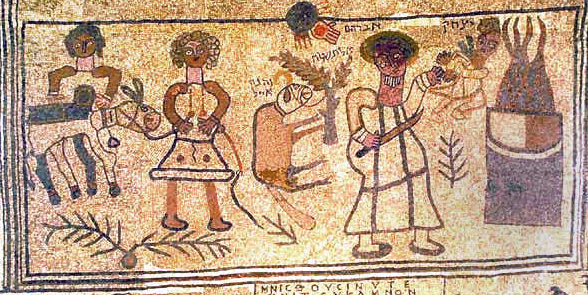In an important study entitled The Gospel of Signs, Robert Fortna correctly identified a Jewish-Christian source embedded in the Fourth Gospel. This article is based upon the conclusions of Fortna’s research and explores their significance. I will also point out additional evidence Fortna overlooked that clarifies the origins and intentions of the Jewish-Christian source embedded in the text of the Fourth Gospel.
Reflections on Mark

Sometimes the work we do for The Life of Yeshua: A Suggested Reconstruction can seem a little hard on the Gospel of Mark. Our research might leave readers wondering whether we have anything positive to say about Mark. The answer given in this blog is a resounding “Yes!”
Robert Lindsey’s Theory of How the Synoptic Gospels Came into Being

The purpose of this video is to describe Robert Lindsey’s theory of how the Gospels of Matthew, Mark and Luke came into being and how they are related to one another.
A Nativity Meditation for 2014

Again and again in the nativity narratives communication somehow breaks down. The story of Jesus’ birth begins with scrambled communications, but that is not where the story ends. In the course of the story, God works through imperfect people to give them the perfect gift of the Messiah.
Demands of Discipleship

“Anyone who wants to join me but puts family ties or love of self ahead of me cannot possibly be my full-time disciple. Anyone who is not prepared to die cannot possibly be my full-time disciple. Anyone who does not renounce his possessions cannot possibly be my full-time disciple.”
Chickens and the Cultural Context of the Gospels

One aspect of the cultural context of the Gospels that is often overlooked is the role played by animals. In this article I will explore the significance of chickens in first-century Jewish culture and the part they play in the story of Jesus.
A Goy’s Guide to Ritual Purity

The concept of ritual purity is perhaps one of the most difficult concepts in the Bible for people to grasp today. Whereas in many “traditional” societies the concept of ritual purity was (and is) taken for granted in daily life, the whole framework for the concept of ritual purity is totally foreign to the secular western mindset.
The Power of Song

Dan’s song, “The Good Judge,” in three well-crafted verses, manages to express so much of what I believe is at the heart of Jesus’ message: God is a faithful Judge, a caring Father and a righteous King.
The Times of the Gentiles and the Redemption of Jerusalem

In this article David Flusser applies the methods of the Jerusalem School of Synoptic Research and the insights of Robert Lindsey’s solution to the Synoptic Problem to Jesus’ prophecy concerning the destruction and liberation of Jerusalem.
Gentiles Demand All These Things

Jesus’ homily on worry (Matt. 6:25-34 ∥ Luke 12:22-31) is compared with two other ancient Jewish texts. All three sources describe gentiles as people obsessed with the basic necessities of food and drink and clothing.
Elijah Prays About Rain

Toward the end of his Epistle, James exhorts his readers to pray with faith for the healing of the sick. When we read that “the prayer of a righteous man has great power in its effects” (James 5:16), we might have expected James to cite the example of Abraham. Genesis 20:17 might have served as the perfect prooftext: “Abraham prayed to God; and God healed Abimelech.” …The example of Elijah that was provided by James, however, seems less obvious and more difficult.
A Time To Fast?

Once, when Jesus and his disciples were enjoying themselves at a dinner party, a simple observation was made: “Your disciples don’t fast!” The observation was innocent and simple enough; it was not an accusation, but an honest exclamation of perplexity. Jesus’ response, however, was far from simple.
The Approval of Abraham: Traditions of God’s Acceptance of Abraham in Early Jewish and Christian Sources

When, in ancient times, people read the account of the life of Abraham, it was common for them to ask, “When did Abraham finally make the grade? At which point in his life was Abraham approved and accepted by God?”
- Page 2 of 2
- 1
- 2

